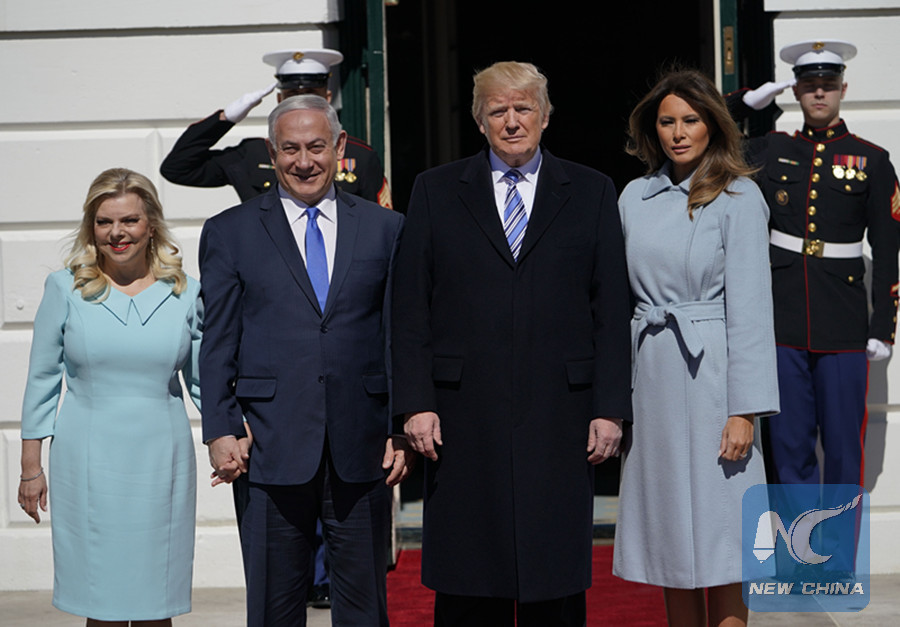
U.S. President Donald Trump and First Lady Melania Trump welcomes Israeli Prime Minister Benjamin Netanyahu and his wife Sara to the White House on March 5, 2018 in Washington,DC.(AFP Photo)
by Keren Setton
JERUSALEM, March 6 (Xinhua) -- Israeli Prime Minister Benjamin Netanyahu failed to push U.S. President Donald Trump to do more to deal with issues such as Iran and Syria, despite their public display of unity, analysts said.
In their fifth meeting within the past year on Monday, Netanyahu and Trump presented a united front on Iran, Israel's arch foe, although Netanyahu would like to see a more active American policy in the Middle East.
"Iran must be stopped. That is our common challenge," Netanyahu said, sitting beside Trump at the Oval Office.
"The issues on the table are particularly profound for both countries, but the order and priorities might be somewhat different," Michael Oren, Israeli deputy minister for diplomacy at the Prime Minister's Office and former ambassador to the U.S., told reporters ahead of the meeting.
Inheriting the Joint Comprehensive Plan of Action (JCPOA) on the Iranian nuclear program, Trump has been critical of it since his candidacy.
Late last year, the American president even announced his decertification of the deal, despite the fact that the U.S. is not ready to abandon it.
Meanwhile, both Israel and the U.S. are extremely concerned about Iran's development of intercontinental ballistic missiles which the JCPOA does not cover. The U.S. threatened to quit the deal unless it is fixed in the coming months.
Netanyahu, who faces corruption investigation back home, told Israeli reporters after meeting Trump that Iran dominated the discussions between the two leaders.
But Trump, also knee-deep in domestic politics and scandals, was not as forceful as Israel hopes for, as there are differences between Netanyahu and Trump on the issue.
Ofer Zalzberg, a senior analyst on Israeli-Palestinian affairs in the International Crisis Group, believes the two differ in their attitudes.
"Netanyahu is more risk averse than President Trump. He is focusing exclusively on Iranian capacities and he is not looking for modalities that would affect Iranian intentions," Zalzberg told Xinhua.
"Netanyahu believes the confrontational stance with Tehran is more effective than a cooperative one and for that he does have a president who shares this impression," he said.
But "the gap is whether this is a stance for bargaining or whether it is credibly backed with a military threat," the Israeli analyst noted.
Last September, the Israeli prime minister told the UN General Assembly that he expects the international community to either "fix it or nix it," when referring to the JCPOA.
"Netanyahu will be looking for American backing, not only tactical support and supplies, but also legal and moral support, should Israel find itself in a more active war situation with Iran and its proxies," said Oren.
However, the U.S. seems to have no enthusiasm for directly engaging in the sticky Syria-Iran-Israel triangle in the Middle East, despite immediate support from the superpower when Israel shot down an Iranian drone entering its airspace from Syria a month ago.
According to Israeli defense officials, a renewed confrontation with Iran and Syria similar to what was seen last month is only a matter of time.
Netanyahu has thus found himself in a bind. After all, he cannot afford to publicly butt heads with Trump, especially after this closest ally has made two controversial moves: recognizing Jerusalem as Israel's capital and deciding to move the U.S. embassy to the disputed holy city in mid-May, when Israel will be celebrating the 70th anniversary of its independence.
"Netanyahu finds himself unable to voice opposition to Trump despite some significant differences of opinion, because Netanyahu himself has characterized him as the most pro-Israeli president ever," said Zalzberg.
"This weakens him in terms of his ability to use U.S. public opinion to push the their president to take a more assertive stance on regional issues," he added.
For now, the Netanyahu-Trump alliance remains a source of comfort for both. With the Israeli leader pre-occupied with corruption scandals that threaten his political future, the solace in Trump's support is priceless for him, regardless of their differences.
"I can think of no time where the two countries have had such a deep confluence of interests and goals," Oren said.

